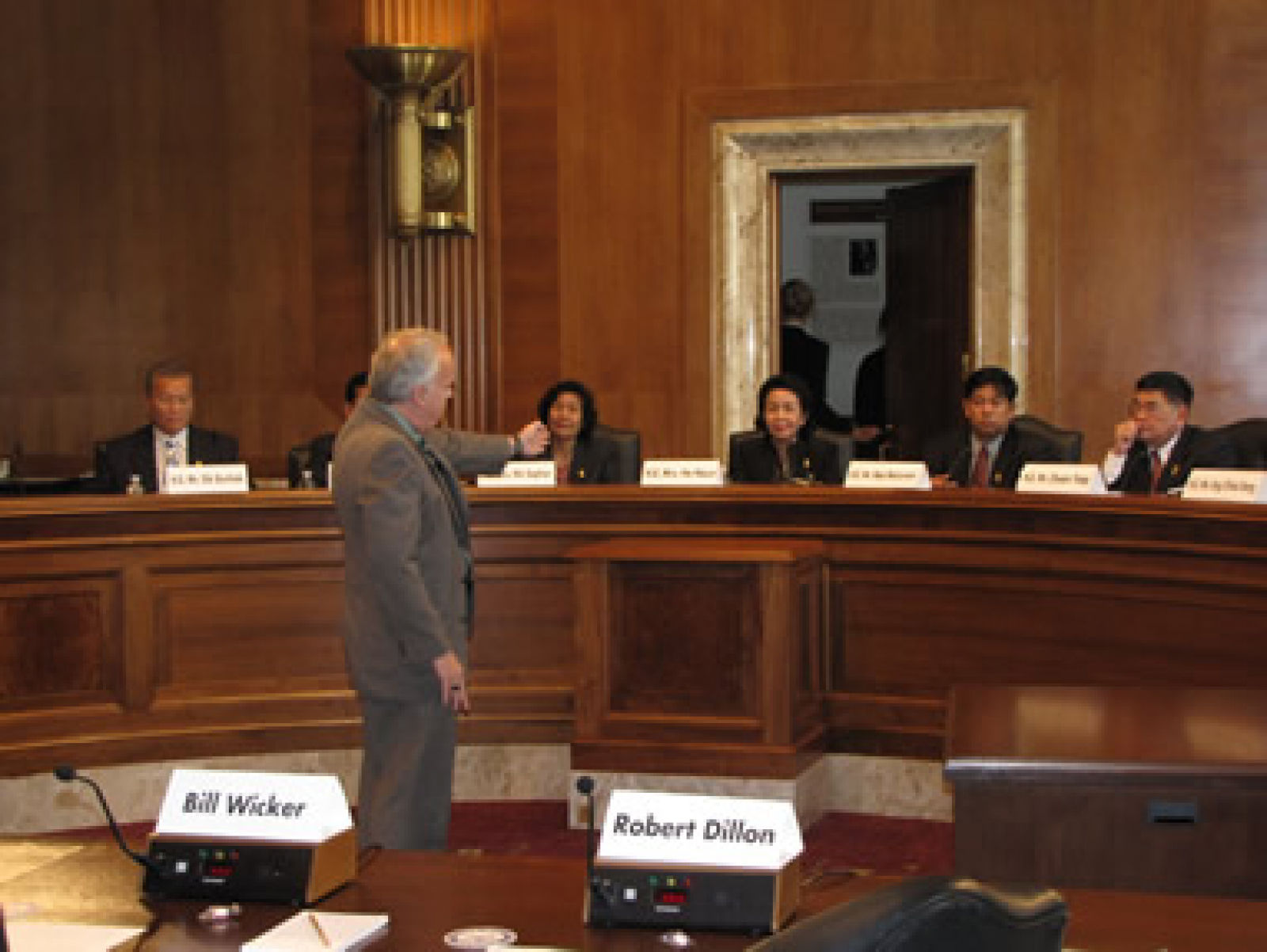
SHARE
Public access, transparency and balance of power in government were among topics covered in a recent study mission to the United States by members of the Cambodian National Assembly (MPs) seeking to strengthen democracy in their country.
The study mission was a collaborative effort of NDI and the Institute for Representative Government (IRG), a bipartisan nonprofit organization established by former members of Congress in 1988 to educate legislators from developing democracies about American legislative systems. The study mission is part of an ongoing partnership between IRG, and NDI and its partner political party institute, the International Republic Institute (IRI).
During the seven-day program, the MPs visited the U.S. Congress and the Maryland State Capitol in Annapolis, Md. The delegation met with a broad range of congressional and policy officials, including Congressman Eni Faleomavaega (D-American Samoa) and Maryland State Senator Jamie Raskin (D). They also consulted with U.S. Senate committee staffs and visited the Congressional Research Service for a briefing on its services for members and an overview of the American legislative process. In addition, the visitors received a briefing at the World Bank on the Extractive Industries Transparency Initiative, an international effort to improve oversight of how mineral resources are managed.
The sessions underscored the importance of transparency in government, which H.E. Yem Ponharith of the Cambodian Human Rights Party and Prey Veng province said was a priority for those seeking to move Cambodia forward. Ponharith said he was particularly impressed with CRS and the visit to the World Bank.
“What we all want is the freedom for democracy for our country,” he said, “so that one day our country will become a country that respects the rule of law and we have justice for society.” Ponharith’s colleague, H.E. Sik Bunhok of the Cambodian People’s Party, stressed the example provided by the balance of power among the three branches of the U.S. government. That was one of many impressions he said would be etched in his memory.
A hearing before the House Foreign Affairs Committee on U.S. food aid provided a first-hand look at the accessibility of members of Congress. After considerable discussion during the program about accountability of elected officials, some of the Cambodian MPs said the hearing – open to anyone there in time to get a seat – was a helpful means of experiencing the fishbowl in which the U.S. Congress operates.
First-hand experiences of this type have been the emphasis of study missions since 2003 when NDI and IRI began a partnership with IRG. The two Institutes work with IRG to ensure that the study missions are tailored to recognize the local political contexts in which the MPs operate. Each participant is carefully chosen with the program goals in mind.
Previous study missions included programs for legislators from Turkey, Indonesia, Jordan, Nigeria, Montenegro, Ukraine and Morocco; a regional program for the five countries of the Andean region; a program for women legislators from Latin America; and most recently, a regional program for three West African countries. NDI has also provided support through its country offices after the completion of each study mission.
To follow up on the most recent study visit, NDI’s field staff in Cambodia will continue to engage with the participants through its programming with the legislature, which includes a Constituency Dialogue program that brings legislators together with their constituents and provides them with an opportunity to discuss and resolve citizens concerns.
NDI began its work in Cambodia in 1992, working with civic organizations, political parties and the National Assembly. Following violent changes in the government in 1997, NDI increased its efforts to monitor the political environment and focused international attention on the need for fundamental changes in Cambodia’s political climate to allow competitive elections. For the 2008 parliamentary elections, NDI collaborated with local partners on programs to promote a free and fair electoral environment. The Institute and provincial civic groups organized 22 candidate debates around the country, involving 93 candidates from all 11 political parties.
Pictured above: Bill Wicker, the communications director for the majority side of the Senate Committee on Energy and Natural Resources, addresses the Cambodian MP delegation in a hearing room on Capitol Hill.
–
Published on August 11, 2009


